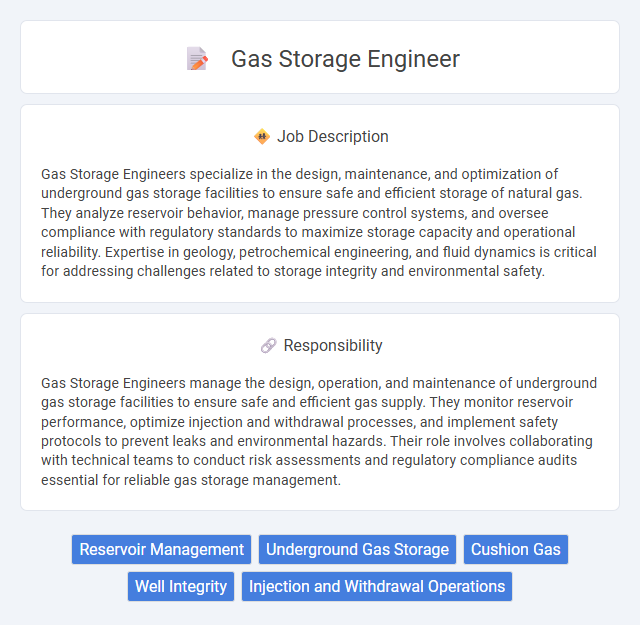
Gas Storage Engineers specialize in the design, maintenance, and optimization of underground gas storage facilities to ensure safe and efficient storage of natural gas. They analyze reservoir behavior, manage pressure control systems, and oversee compliance with regulatory standards to maximize storage capacity and operational reliability. Expertise in geology, petrochemical engineering, and fluid dynamics is critical for addressing challenges related to storage integrity and environmental safety.
Individuals with strong analytical skills and a keen eye for safety protocols are likely well-suited for a Gas Storage Engineer role, given the technical and high-responsibility nature of the job. Those who thrive in structured environments and can manage complex infrastructure maintenance under pressure may find this career fulfilling. Conversely, people lacking attention to detail or comfort with rigorous safety standards might struggle in this field.
Qualification
A Gas Storage Engineer typically holds a bachelor's degree in petroleum engineering, chemical engineering, or a related field, accompanied by professional certifications such as PE (Professional Engineer) or PMP (Project Management Professional). Proven expertise in reservoir engineering, storage facilities design, and safety compliance is essential for managing underground gas storage operations effectively. Strong analytical skills and familiarity with industry standards like API 1171 and risk assessment protocols enhance a candidate's qualification for this role.
Responsibility
Gas Storage Engineers manage the design, operation, and maintenance of underground gas storage facilities to ensure safe and efficient gas supply. They monitor reservoir performance, optimize injection and withdrawal processes, and implement safety protocols to prevent leaks and environmental hazards. Their role involves collaborating with technical teams to conduct risk assessments and regulatory compliance audits essential for reliable gas storage management.
Benefit
Gas Storage Engineer roles likely offer significant benefits such as competitive salaries and opportunities for career advancement in the energy sector. Employees may experience enhanced job security due to the critical nature of natural gas storage and management. Access to advanced technologies and continuous professional development could also be common advantages in this field.
Challenge
Working as a Gas Storage Engineer likely involves navigating complex technical challenges related to the safe and efficient storage of natural gas under varying pressure and temperature conditions. There is probably a high demand for problem-solving skills to manage risks such as leakage, structural integrity, and regulatory compliance. The role may frequently require innovation to optimize storage capacity while ensuring environmental and safety standards are met.
Career Advancement
Gas Storage Engineers manage and optimize underground gas reservoirs, ensuring safe and efficient storage operations. Advancing in this career often involves gaining expertise in reservoir simulation, regulatory compliance, and project management, leading to senior engineering roles or supervisory positions. Mastery of cutting-edge technologies and cross-functional collaboration enhances opportunities for leadership and specialized technical consultancy.
Key Terms
Reservoir Management
Gas Storage Engineers specializing in Reservoir Management optimize subsurface gas reservoirs to maximize storage capacity and ensure safe, efficient withdrawal and injection processes. They analyze reservoir performance data, develop simulation models, and implement strategies to maintain reservoir integrity and enhance recovery rates. Expertise in geological assessment, pressure management, and fluid dynamics is essential for sustaining operational reliability and meeting regulatory standards.
Underground Gas Storage
A Gas Storage Engineer specializing in Underground Gas Storage manages the design, operation, and maintenance of subterranean reservoirs used for natural gas storage. They analyze reservoir performance, ensure safety compliance, and optimize injection and withdrawal processes to maintain pressure and integrity. Their expertise supports energy supply stability and efficient gas delivery in seasonal demand fluctuations.
Cushion Gas
A Gas Storage Engineer specializes in the design, operation, and maintenance of underground gas storage facilities, focusing on optimizing cushion gas management to maintain reservoir pressure and ensure operational safety. Cushion gas, critical for stabilizing gas storage reservoirs, typically constitutes 20-40% of the total gas volume and must be carefully managed to balance storage capacity and cost efficiency. Expertise in reservoir geology, fluid dynamics, and regulatory compliance is essential for maximizing cushion gas performance while minimizing environmental impact.
Well Integrity
Gas Storage Engineers specializing in well integrity ensure the safe and efficient containment of gas within underground storage facilities by monitoring and maintaining wellbore conditions. They analyze pressure data, conduct integrity testing, and implement corrosion prevention measures to prevent leaks and environmental hazards. Expertise in regulatory compliance, risk assessment, and advanced well monitoring technologies is essential for safeguarding storage operations.
Injection and Withdrawal Operations
Gas Storage Engineers specialize in optimizing injection and withdrawal operations to maintain pipeline integrity and meet fluctuating demand. They utilize advanced simulation software to monitor pressure, temperature, and flow rates, ensuring efficient gas injection during low-demand periods and reliable withdrawal during peak consumption. Expertise in reservoir management and compliance with safety regulations is critical for minimizing operational risks and maximizing storage capacity.
 kuljobs.com
kuljobs.com